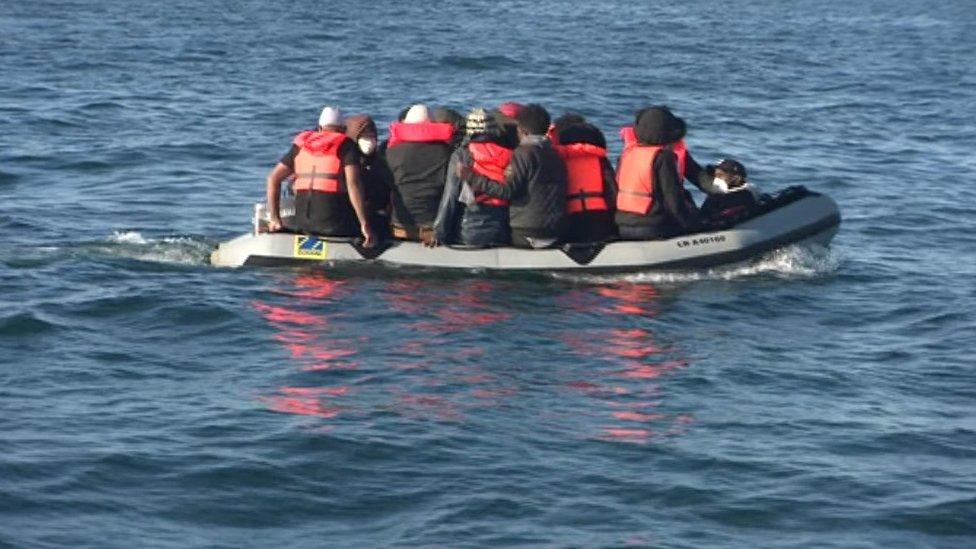Priti Patel defends deal to stop rising numbers crossing Channel
- Published
Border Force officers pick up migrants in the Channel
Home Secretary Priti Patel has defended a new £54.2m deal with France to stem the rising number of migrants crossing the English Channel.
The number of people crossing the Channel this year is now more than the total for all of 2020.
She denied it was "sending good money after bad" after a £28.2m deal last November failed to limit crossings.
Calais MP Pierre-Henri Dumont suggested it would not have an impact as the French coastline is too long to patrol.
Giving evidence to the Home Affairs Committee, Ms Patel said it was an "evolving situation", with the numbers of those attempting the crossing having "increased considerably".
On Monday at least 430 migrants crossed the Channel - a record for one day. The previous daily high of 416 was set in September last year.
And on Wednesday, a group of migrants was seen arriving at Dover, bringing the total number this year to more than the 8,461 who made the crossing in 2020.
The group included at least five children, according to reports.
The deal agreed on Tuesday between London and Paris will see France double the number of police patrolling its beaches. It will also fund improved intelligence sharing and introduce better technology to target the gangs who organise the crossings.
But some have questioned whether it will have an impact.

Bedding down on the floor and no medical support
By BBC home editor Mark Easton, in Kent
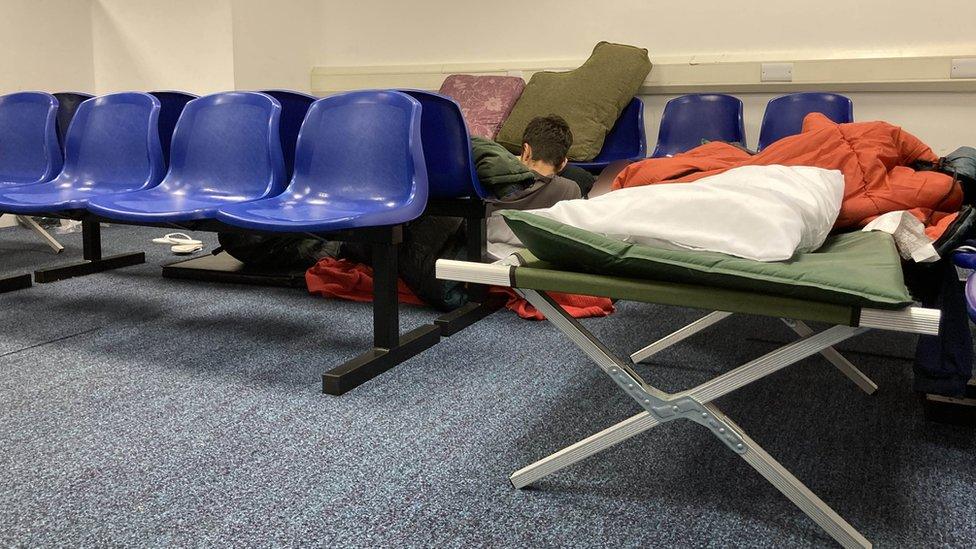
Boys sleep on the floor in one holding centre in Kent
The terrace of the Stade hotel, on the seafront in Hythe, is festooned by England flags. But its usual summer guests have been told their holidays there are cancelled. The hotel's owner says it has been block booked for 68 days by the Home Office - at an irresistible price to him of £5,000 a day.
The occupants are young men who tell us - from their balconies - that they are 16 or 17 and from Iran. One has been there 11 days and they aren't allowed to leave their rooms.
Between 15 and 20 unaccompanied migrant children are currently accommodated in a government office building, Frontier House in Folkestone, in sleeping bags on camp beds and reportedly without proper washing facilities or medical support. One agency has warned that the children's welfare is deteriorating.
The BBC has obtained photographs of conditions in one holding centre that show young boys sleeping on the floor with cushions for pillows and military-style camp-beds, trying to get some rest in what looks like an office waiting room.
Kent County Council has for a second year said it is unable to care for any more unaccompanied child asylum seekers. It is currently looking after 358 of them.

Conservative MP Tim Loughton said "giving the French more money to carry on doing what they're doing badly is not going to solve the problem."
The home secretary said there had been a "complete change in modus operandi in terms of the crossings", with a "widespread dispersal" of launches of small boats "along the whole French coastline" rather than people just coming from Calais.
She said France had intercepted more boats than they did this time last year, because the numbers are "so high" and are "going up."
And she stressed that France would "argue they are doing their bit" but said they have a "different interpretation" of how to save lives at sea.
Border Force director general Paul Lincoln said last year France had made more than 2,100 interceptions of boats last year, while this year the figure was now over 6,000.
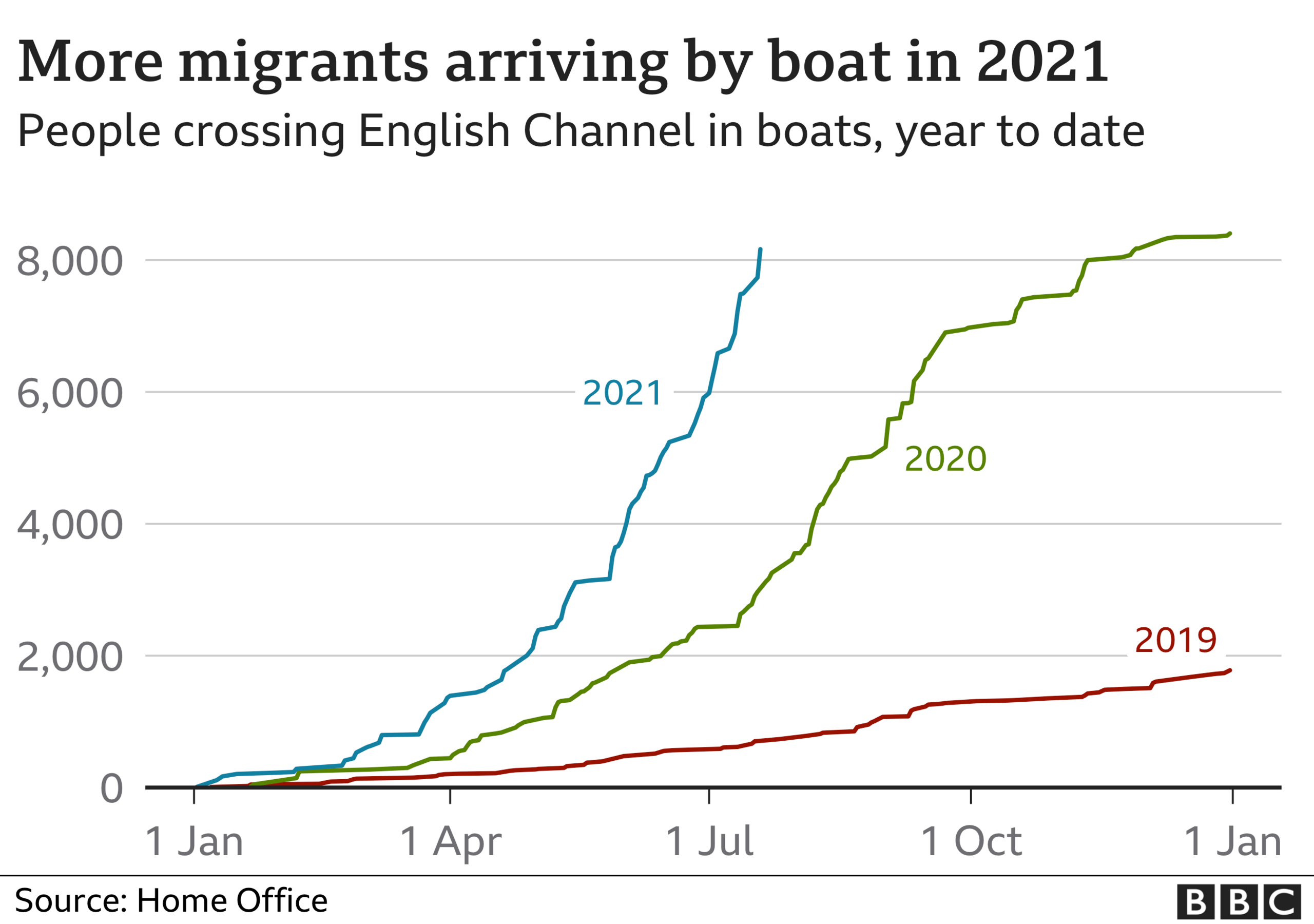
Calais MP Mr Dumont has suggested the new deal would not have an impact as the French coastline is too big.
He told the Today programme: "The fact is, we've seen it before. Having more money, having more police officers, having more controls, will not prevent people to succeed in these crossing attempts.
"We have too many kilometres of shore to monitor."
Mr Dumont added that the French are not supposed to intervene at sea - yet former Border Force chief Tony Smith has called for joint patrols.
Mr Smith said: "That seems to be a step too far for the French at the moment. The French position is they are not prepared to intervene on the high seas, only on land."
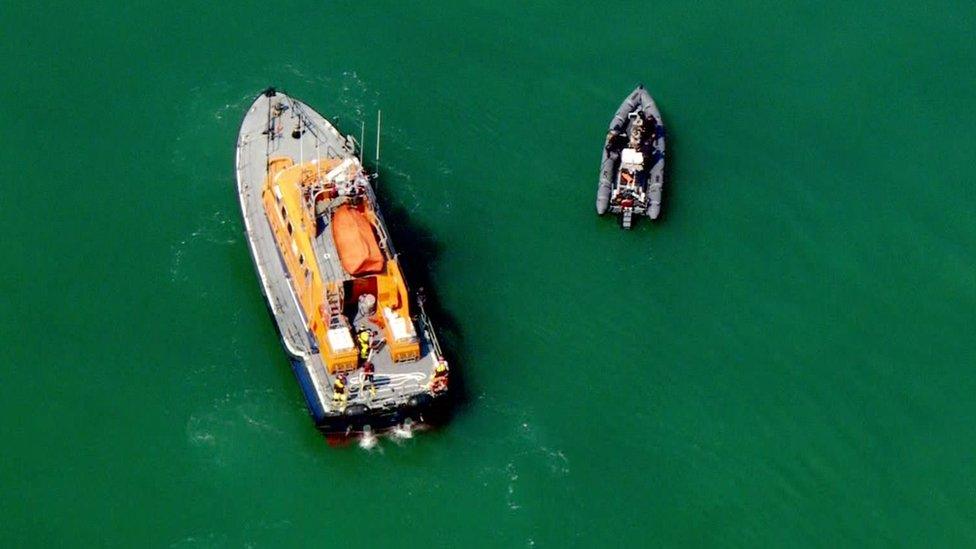
An RNLI lifeboat assisting with the arrival of a small boat on Wednesday
Ms Patel and French interior minister Gerald Darmanin have agreed to "strengthen co-operation" over the crossings.
She told the Home Affairs Committee she had discussed with the French their obligations are under international law to return migrants trying to cross the Channel to their territory. She added they were looking at everything that could be done to save lives at sea, saying of the French: "They absolutely know what their responsibilities are."
The Home Office said UK support last year helped France double the number of officers deployed daily on the beaches of its northern coast.
The new support announced by the UK would enable France "to respond by posting more security forces further up the coast, installing and utilising the latest surveillance equipment throughout northern France", the Home Office said.

'No quick and easy fix'
Analysis by Simon Jones, BBC reporter, in Dover
From the famous White Cliffs of Dover, we watched this morning as another group of migrants was brought to shore by the Border Force, having been picked up in the Channel.
Conditions at sea are once again incredibly calm and the sun is shining, so these are unlikely to be the only arrivals today.
Almost 1,000 people have reached the UK by boat in the past three days, putting pressure on the home secretary to act.
Priti Patel is now pledging more money to the French authorities to try to prevent the crossings. But the deal struck last night is very similar to one agreed between Britain and France last November - which has failed to stem the numbers arriving, though the Home Office points out the number of crossings being prevented by the French authorities has doubled.
The government here accepts there is no quick and easy fix to problems with the asylum system, but there's no doubt the home secretary will want to see swift results in return for the increased investment in northern France.

Ms Patel has previously pledged to make Channel crossings "unviable", with new legislation that will make it a crime to knowingly arrive in the UK without permission.
The Nationality and Borders Bill, which is currently being considered by MPs, will mean migrants entering without permission could face up to four years in prison.
The government hopes the overhaul of asylum rules will deter migrants from making the crossing.
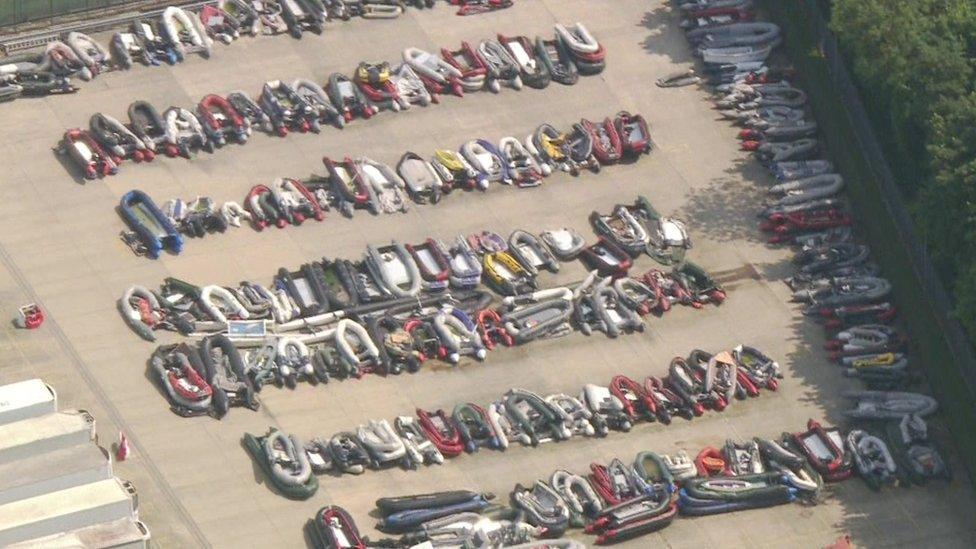
There are dozens of small boats in storage in Dover
But the plans have been criticised by charities including Refugee Action, which has called them "extreme and nasty".
Amnesty International's Steve Valdez-Symonds told the BBC the new legislation was an "extremely reckless and dangerous response" to the issue and would not tackle the problem of people smugglers.
Labour shadow home secretary Nick Thomas-Symonds said the Home Office announcement was "yet more empty words from the Conservatives about agreeing a deal with France to address trafficking gangs".
Number 10 said the government was "doing two things in parallel" to tackle migrant crossings.
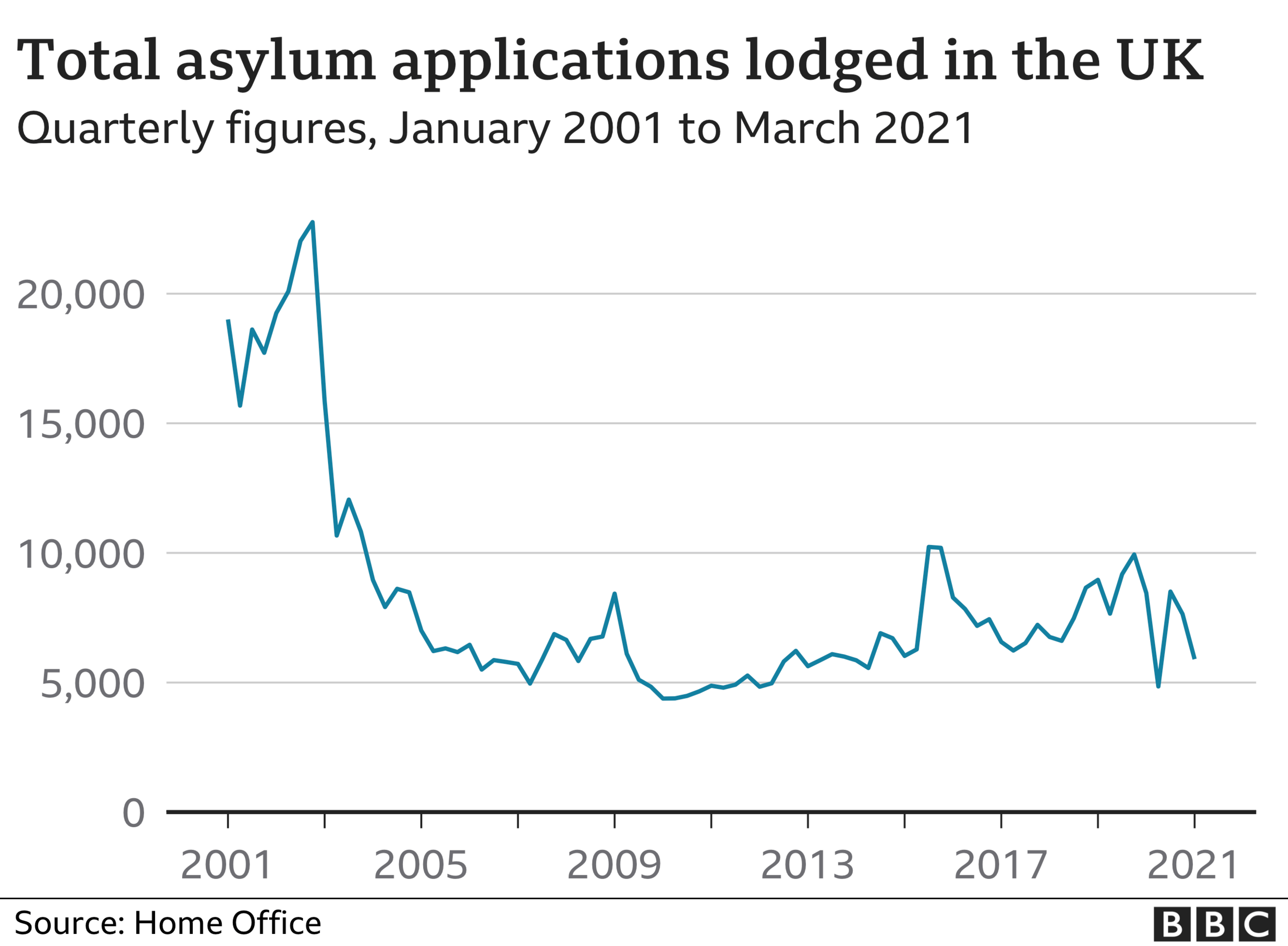
- Published21 July 2021
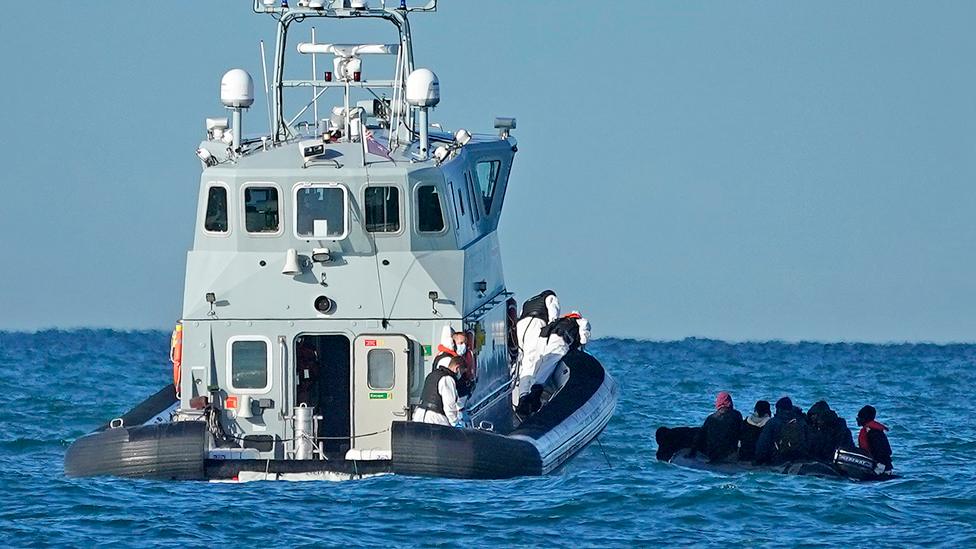
- Published20 July 2021
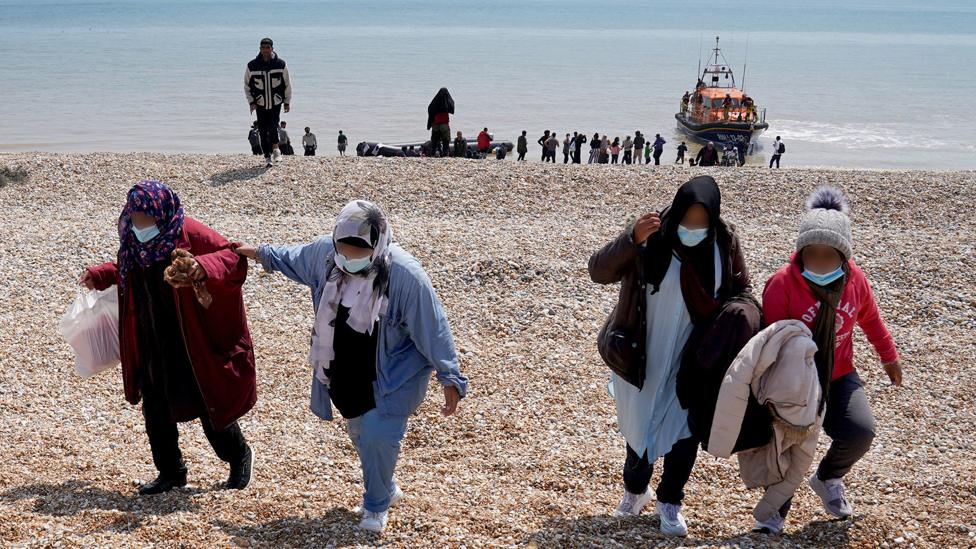
- Published19 July 2021
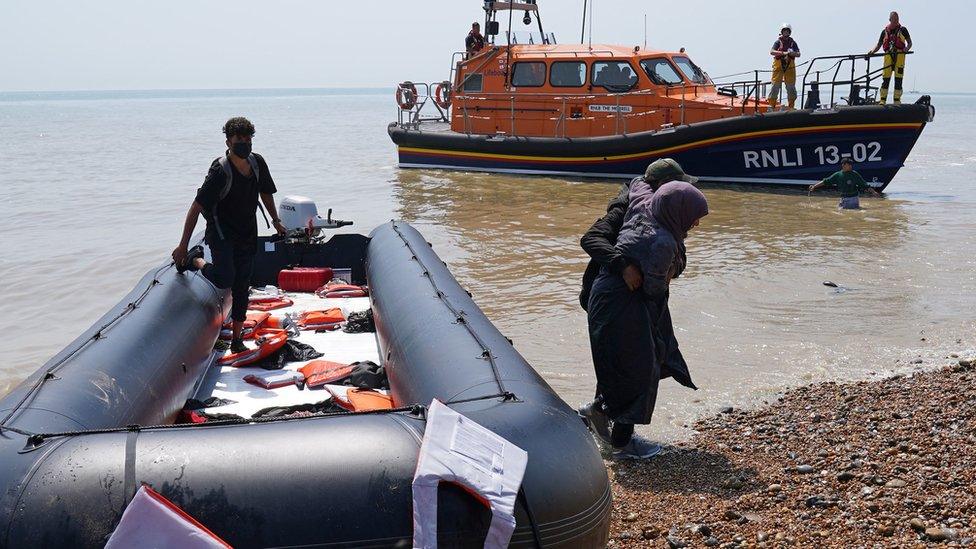
- Published13 July 2021

- Published29 June 2021
